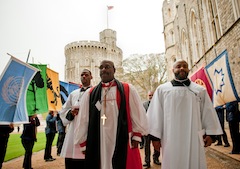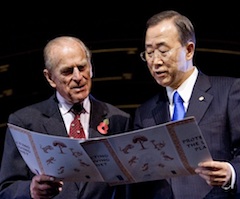|
|
|
|
 |
|
Windsor 2009
 |
 |
 |
Delegates from the New Psalmist Baptist Church in Baltimore, USA, process to Windsor Castle |
In November 2009, ARC and the United Nations Development Programme joined together to create an extraordinary event. The celebration, titled Many Heavens, One Earth at Windsor Castle in November 2009 launched 31 long-term commitments to environmental action by nine major faiths worldwide.
A further 18 commitments were made by major secular groups to work with the faiths on the environment, while other faiths, including the Mongolian Buddhists, started their own journey of creating their own long-term commitments.
 |
| "Potentially the biggest civil society movement on climate change in history" and “the biggest mobilisation of people and communities that we have ever seen on this issue” - UN Assistant Secretary-General Olav Kjørven |
|
 |
 |
The faith commitments were made in the presence of HRH Prince Philip, and HE Ban Ki-moon, Secretary-General of the United Nations.
Words used to describe the Windsor Celebration included "inspiring", "moving", "humbling".
UN Assistant Secretary-General Olav Kjørven described it as: “potentially the biggest civil society movement on climate change in history”, and “the biggest mobilisation of people and communities that we have ever seen on this issue”.
 |
 |
 |
Prince Philip and Ban Ki-moon at the Windsor Celebration |
"A unique position"
UN Secretary-General Ban Ki-moon said the world’s faith communities occupied "a unique position in discussions on the fate of our planet and the accelerating impacts of climate change.”
That was because of the scale of their reach, he said: “You are the leaders who can have the largest, widest and deepest reach.
“Together the major faith groups have established, run or contribute to more than half of all schools worldwide.
“You are the third largest category of investors in the world. You produce more weekly magazines and newspapers than all the secular press in the European Union. Your potential impact is enormous.”
He added: “You can – and do – inspire people to change.”
Faith commitments
The Windsor Celebration on November 2-4, 2009, marked a pivotal moment in the growing recognition of the role of faith groups in environmental action.
The gathering of nearly 200 faith and secular leaders was the first ever internationally-coordinated commitment by all the worlds major religions to the environment. By pledging themselves to environmental action the event was aimed at shaping the behaviour and attitudes of the faithful for generations to come.
Commitments by the faith groups presented at Windsor included the announcement by the Grand Mufti of Egypt, Sheikh Ali Goma'a, that Islam's second holiest city Madinah would become a model green city, and moves would begin to make the hajj more environmentally friendly within three years.
Other announcements included:
Plans by the Shinto of Japan to develop a sacred forestry standard for religious forests;
Proposals to plant of 8.5 million trees to address serious deforestation on Mount Kilimanjaro, Tanzania;
Plans to install solar panels on Daoist temples throughout China; and
Proposals to halve the Jewish community's meat intake by 2015.
The faiths' pivotal role
ARC Secretary General Martin Palmer said: "The potential revealed by the Windsor Process for faith groups to lead civil society in tackling our environmental crisis has been widely recognised - especially in the light of the collapse of the 15th United Nations Framework Convention on Climate Change in Copenhagen in December 2009.
"Given that organised religions make up the largest group in civil society - 80 percent of the world’s population ascribe to a faith - that pivotal role is now being acknowledged by major environmental organisations and secular institutions worldwide who are keen to engage with the faiths in this innovative and vital work.
"The great strength of the faiths is that they are the most sustainable of all human institutions having outlived empires, dynasties and ideologies. This means that they also take time to move. The commitments were in many cases major long-term plans, which will take time to unfold and to go through the process of internal debate and discussion."
More information
For more information about the initiatives launched at the Windsor event, click here for the Year After Windsor report.
|
 |
|
|
|
|
|
 |
October 14, 2009:
PRESS RELEASE: Many Heavens, One Earth
The Celebration of Faith Commitments for a Living Planet, to be held at Windsor on November 2-4, 2009, will be attended by His Royal Highness, The Prince Philip, Duke of Edinburgh
and the Secretary-General of the United Nations, His Excellency Mr Ban Ki-moon |
 |
November 03, 2009:
Faiths “occupy a unique position” in discussions on the planet – UN Secretary-General Ban Ki-moon
UN Secretary-General Ban Ki-moon acknowledged religion’s vital role in protecting the environment in his keynote address at the Windsor Celebration. In a heartfelt speech at Windsor Castle in front of HRH The Prince Philip and faith and secular leaders, Mr Ban said the world’s faith communities occupied “a unique position in discussions on the fate of our planet".
|
 |
January 14, 2010:
Copenhagen failure down to 'self-centred' thinking
Pope Benedict has denounced the failure of world leaders to agree on a new climate change treaty at Copenhagen, saying the same "self-centred and materialistic" way of thinking behind the worldwide financial meltdown was also endangering creation. |
 |
 |
|
|

